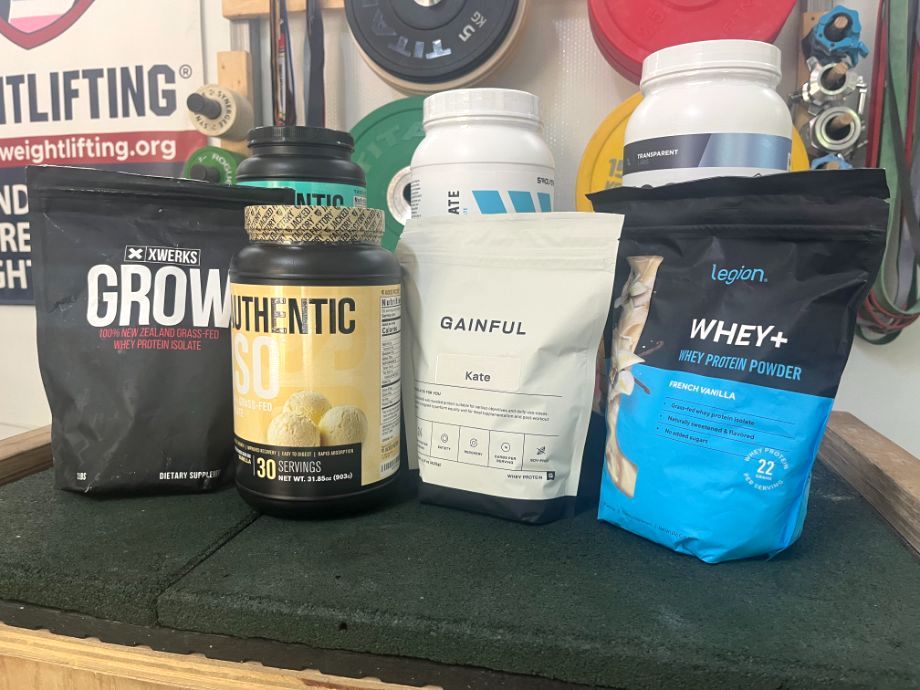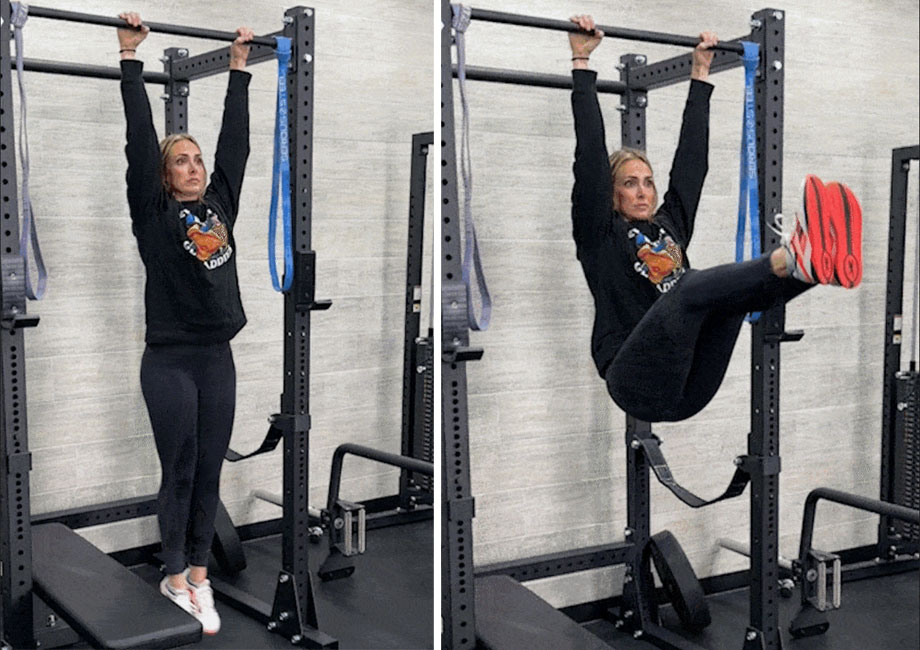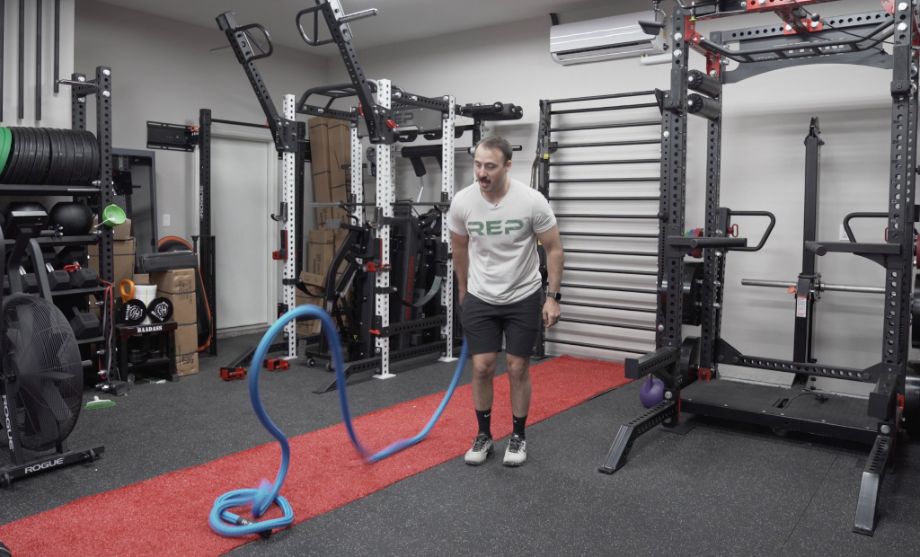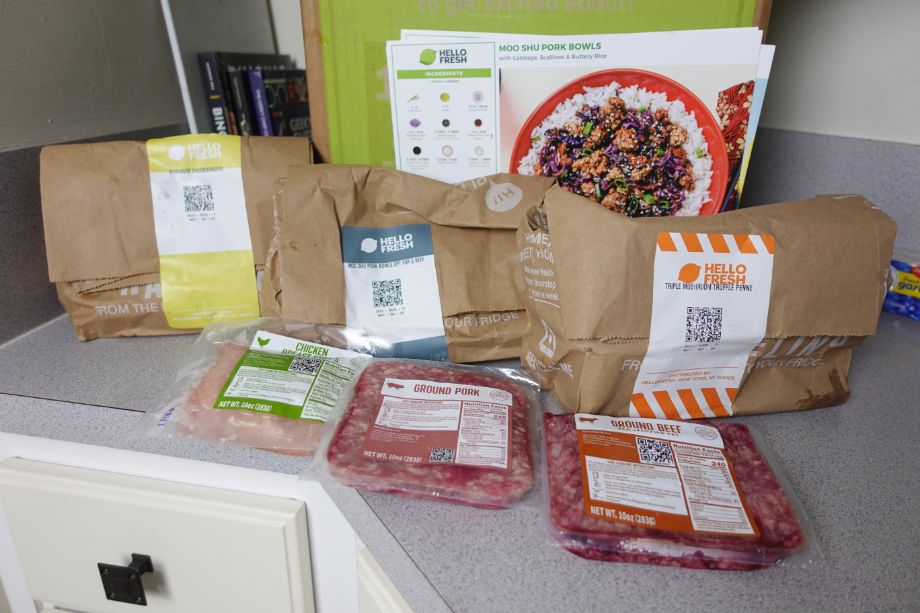Whey protein is one of the most popular, and most researched, protein supplements on the market. As a complete protein, the best whey protein checks a lot of boxes as far as what most people are looking for in a protein powder. Fast-acting and easily soluble, it’s a favorite for a reason.
Still, it’s not for everyone. Since whey is a milk-derived protein, people with milk sensitivities or allergies, as well as people following vegan or plant-based diets, need other options for their protein supplement. I talked with USA Weightlifting’s sports dietitian Meagan O’ Connor, RD, about the different types of protein available to use instead of whey. Read on to find our best alternatives to whey protein.
Medical disclaimer: This article is intended for educational and informational purposes only. It is not intended as a substitute for medical advice. For health advice, contact a licensed healthcare provider.
What’s Whey Protein?
To know why you could need alternatives for whey protein powder, first you need to know: what is whey protein?
Whey protein is sourced from milk during the cheesemaking process. Liquid whey is separated from solid curds, and then carbohydrates, fat, and water are separated, and the leftover protein is then dried into a powder. Based on how the protein is filtered and processed, there are three types of whey protein:
- Whey Protein Isolate: Often considered the highest quality of the whey proteins, as it contains less fats and carbs than other options, whey protein isolate goes through heavy filtering until the powder is at least 90% protein1. This will oftentimes make it the pricier whey option, as well.
- Whey Protein Concentrate: Whey protein concentrate hasn’t been processed and filtered as much as isolate, and therefore will have more fats and lactose. The protein content can range anywhere from 35% to 80%1. Although whey isolate is considered the more high-quality protein, the amino acid profile of concentrate is the same.
- Whey Protein Hydrolysate: The easiest form of whey to digest, whey protein hydrolysate has been partially broken down through the process of hydrolysis. Because it’s easier to digest, this type of protein is commonly used in infant formulas and for those with gastrointestinal issues.
Protein as a macronutrient breaks down into peptides and then amino acids, which are the building blocks of muscles. Whey protein is considered a complete protein because it contains all nine essential amino acids needed in a diet, as your body can’t produce them on its own.
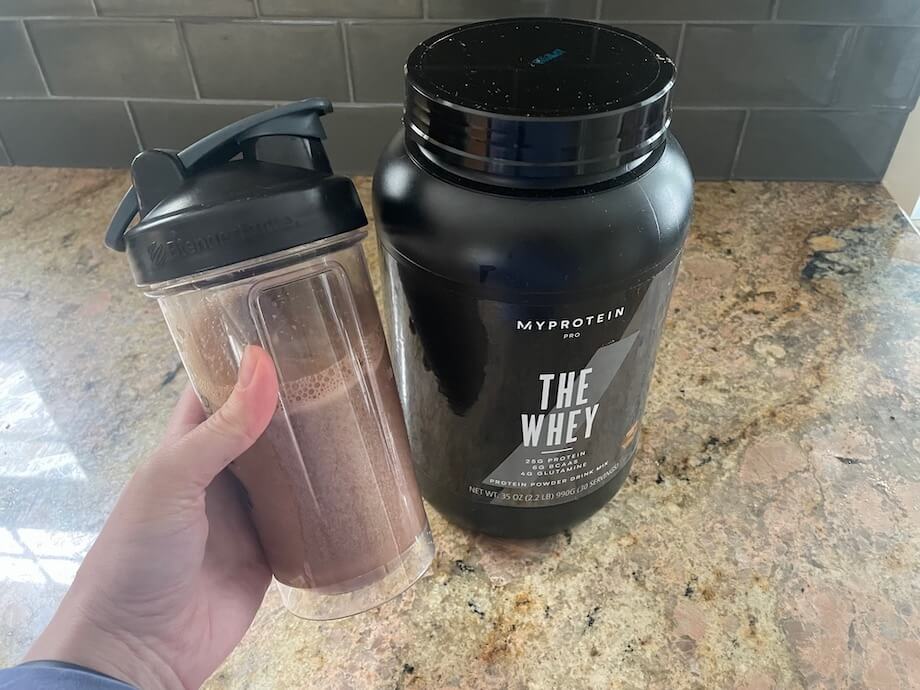
Whey protein is popular with athletes, bodybuilders, and fitness enthusiasts alike because it helps meet daily protein intake requirements to maximize building muscle and maintaining lean muscle mass during weight loss. Studies2 have shown that whey protein has helped increase strength and muscle growth when combined with resistance training. Additionally, whey releases amino acids into the body quickly, making it a popular post-workout recovery drink.
Why Use Whey Alternatives?
Sometimes, you just want to change it up with your protein powder and try to find the best protein powder for you and your protein shakes. Still, there are other viable reasons to venture outside of the ever popular whey protein.
- Lactose intolerance or dairy allergy: Because whey is derived from milk, those with sensitivities to lactose or a dairy allergy will likely want to steer clear from whey protein. If it’s lactose intolerance, you can try a more filtered whey protein like isolate, which would have less lactose, before trying other lactose-free protein sources.
- Digestive issues: A common side effect of whey protein can be digestive issues, such as bloating or stomach pains. If you commonly have gastrointestinal distress after consuming whey protein, it may be worth it to look into other protein supplements. If all protein powders bother you, Meagan suggests getting extra protein from more whole food sources.
- Dietary preferences: Sometimes it’s not an allergy or nasty side effect that makes us avoid whey protein. Sometimes there are dietary restrictions—in this case, a vegan or plant-based diet. For those following a vegan diet or a strict plant-based diet, they should avoid animal-based products, such as whey protein and the other milk-sourced protein, like casein.
- Cost: Protein powder can be expensive, and whey protein powder is no exception. Because of this, it might cause someone to explore other budget-friendly options with protein supplements.
Alternatives to Whey Protein
If you’ve had your fill of whey protein and are looking for a different supplement, here are some of the best whey protein alternatives.
Casein Protein

Casein protein is another milk-sourced protein made from milk. In the cheesemaking process, whey is separated from solid curds, which contain casein protein. These curds can go on to be used in foods, or they can be processed into casein protein powder. Casein protein is also a complete protein like whey, although their amino acid profile differs some.
RELATED: Casein Protein Vs Whey Protein
The best casein protein powder is slow-digesting, causing a slower release of branched chain amino acids than whey protein does. Because of this, casein is often taken before bed to help have a slow release of proteins and BCAAs in the body during sleep and recovery. A June 2020 review3 suggests that casein taken before bed can help improve muscle protein synthesis, as well as improving muscle recovery and reducing soreness.
Surprisingly, casein protein can be an alternative to whey if you’re lactose intolerant. Lactose is removed from casein in its filtering and processing, making most casein proteins lactose-free4. This, however, won’t mean that casein is fine for people with allergies to dairy products, or even a milk intolerance. In general, if milk bothers you, there are other options for protein powders.
Plant-Based Protein Powders
Often, people will search for protein powders based on their dietary restrictions or allergies. If you’re avoiding animal products for one reason or another, then plant-based protein powders are a fantastic alternative. Because of this, the best vegan protein powder is often a blend of different plant-based proteins.
Blends of plant-based protein powders are popular because most plant proteins aren’t complete proteins and are lacking one or more of the nine essential amino acids. For this reason, plant protein powders are often blended to provide an abundance of essential amino acids. Below are some of the more popular plant-based protein powders.
Soy Protein Powder
Soy protein is one of the few plant-based proteins to be a complete protein. In addition, a 2020 randomized trial5 found no differences between strength and muscle size between participants who took soy protein and those who took whey, when they both had the same amount of the essential amino acid leucine, the catalyst for muscle protein synthesis.
Brown Rice Protein
Brown rice protein is a great option for those with allergies. However, it’s not a complete protein, so you’ll need to find other sources to get all essential amino acids in your diet. When compared to whey protein in a 2013 study6, taking 48 grams of either protein showed similar results when combined with resistance training.
Pea Protein Powder
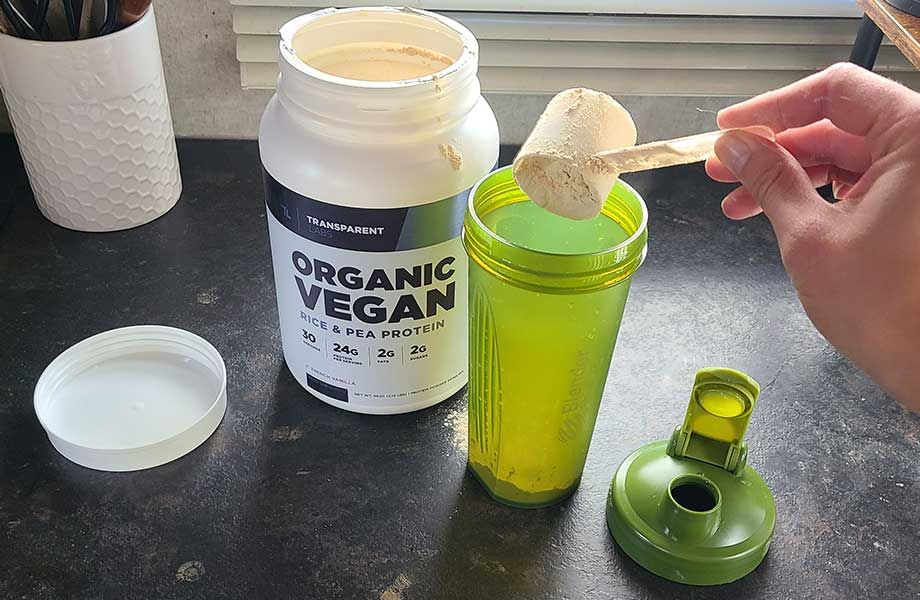
Pea protein powder is technically a complete protein, although it has relatively low levels of the essential amino acids methionine and cysteine. Because of that, it’s still a good idea to blend this protein with another. Meagan suggests mixing pea protein with brown rice protein, as they fill each other’s profile gaps very well.
Hemp Seed Protein Powder

Classified as a complete protein, hemp protein powder is a great alternative that also provides a good supply of omega-3 fatty acids, which has anti-inflammatory properties.
However, a 2018 study7 showed that hemp protein didn’t meet the recommended amount of leucine, as set by the World Health organization. Since leucine is so important to kickstart muscle protein synthesis, it’d be important to also supplement with another protein to meet your leucine needs.
Egg White Protein
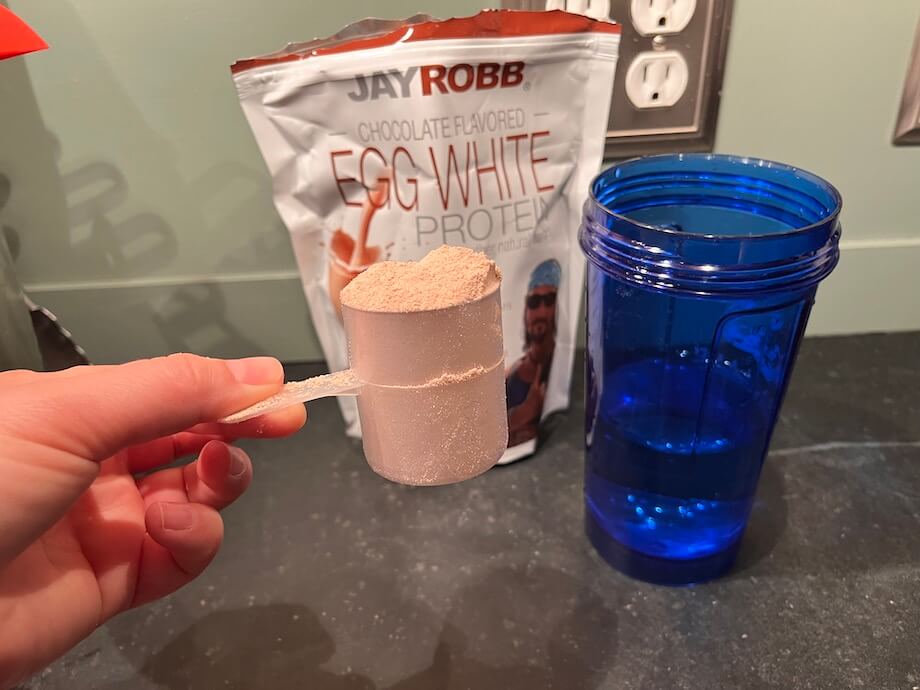
If stomach trouble is what’s leading you to search for alternatives to whey, egg white protein powder can be a great solution. This protein powder is highly digestible and is a complete protein just like whey protein, with a good amount of the branched-chain amino acids isoleucine, leucine, and valine.
Another added perk is that egg white protein powder is low in cholesterol. While this will be the case with most protein powders, this is something to point out due to the bad reputation eggs can get from their fat and cholesterol content. However, recent research8 suggests that this isn’t the case.
Collagen Protein
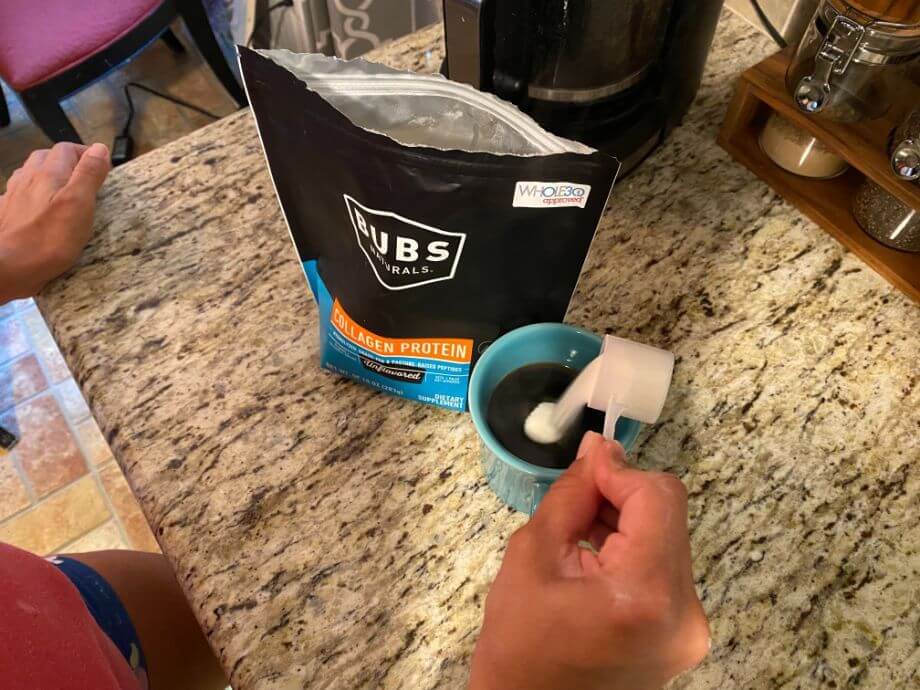
While collagen supplements aren’t complete proteins, Meagan suggests them because of other health benefits. “ Even though it isn’t a complete protein, it can help with tendons, ligaments, joints, and even aesthetic things like nails and hair.”
It has a bunch of benefits, but Meagan warns to make sure you’re getting enough complete protein throughout the day. Also, get collagen with vitamin C added, or ensure you’re getting the vitamin in your diet, since vitamin C helps with collagen production.
Beef Protein Powder
This is exactly what it sounds like. Beef protein has been processed and dried into a powdered form. Considered a complete protein like whey, casein, and soy, this can be a great source of protein for those with a milk or lactose intolerance. However, this won’t be the option to go with for those living a vegan lifestyle.
RELATED: Best Lactose-Free Protein Powder
Protein Powder Alternatives
Maybe you just want a break from protein shakes. If that’s the case, here are a few high-protein foods that you could add to your diet. Regardless, you should be getting the majority of your protein intake from whole food sources.
- Protein bars: This might be cheating, as the best protein bars often are sourced with types of protein powders listed above, but if you’re looking to shift away from protein shakes, a bar might fit your needs. The amount of protein will vary, but typically there’s between 10 and 20 grams of protein in a bar.
- Animal protein: Obviously, if you need a good protein source, animal protein and meats are where it’s at. Stick with leaner cuts of meat to keep the amount of unhealthy fats low: choose chicken breast, lean beef, or fish. Meagan recommends canned tuna as a quick, protein-packed snack.
- Eggs: Eggs in the morning are a great way to boost your protein intake. According to FoodData Central9, a large egg has 6 grams of protein.
- Greek yogurt: This yogurt is pretty versatile in the ways you can prepare it: with nuts, fruits, and other toppings. It’s also got a pretty good amount of protein; there are over 10 grams in a 3.5-ounce serving of fat-free Greek yogurt9.
- Cottage cheese: Another dairy product with a good amount of protein, cottage cheese has 11 grams of protein in a serving of 3.5 ounces9.
- Overnight oats: The protein content of this tasty treat will depend on the toppings or additions you add. Mix milk, oats, and protein powder of your choice together, top with fruits, yogurt, or even chia seeds for more protein, and then leave in your fridge overnight. Enjoy it in the morning!
RELATED: How to Use Protein Powder
Alternatives to Whey Protein: Final Thoughts
Because of its popularity, many people may think that whey protein is the only protein supplement available—but that’s just not the case. For people with allergies, intolerances, or dietary restrictions, there are many alternatives to whey protein.
Find one that works for you, but remember to get the majority of your protein from whole food sources. Also, if your protein powder isn’t a complete protein, find ways to ensure you’re getting adequate essential amino acids elsewhere.
Alternatives to Whey Protein: Q&A
What are some alternatives to whey protein?
There are many different alternatives to whey protein, including another milk-derived protein: casein. Additionally, there are plant-based proteins like soy protein, pea protein, brown rice protein, and hemp protein. Beyond that there’s even egg white protein powder.
What are some other sources of protein?
Common sources of protein are animal protein and eggs. However, you can get a decent amount of protein from dairy products like Greek yogurt and cottage cheese, as well as plant-based proteins like soy and peas.
What is a good substitute for whey protein in smoothies?
Because casein doesn’t mix as well in a smoothie or shake, a good substitute for whey protein would be a plant-based protein like pea protein or brown-rice protein. However, be warned that this may affect the flavor profile of the smoothie.
These statements have not been evaluated by the Food and Drug Administration. This product is not intended to diagnose, treat, cure, or prevent any diseases.
References
- Madureira AR, Pereira CI, Gomes AMP, Pintado ME, Xavier Malcata F. Bovine whey proteins – Overview on their main biological properties. Food Res Int. 2007 Dec;40(10):1197–211. doi: 10.1016/j.foodres.2007.07.005. Epub 2007 Aug 3. PMCID: PMC7126817.
- Jäger R, Kerksick CM, Campbell BI, Cribb PJ, Wells SD, Skwiat TM, Purpura M, Ziegenfuss TN, Ferrando AA, Arent SM, Smith-Ryan AE, Stout JR, Arciero PJ, Ormsbee MJ, Taylor LW, Wilborn CD, Kalman DS, Kreider RB, Willoughby DS, Hoffman JR, Krzykowski JL, Antonio J. International Society of Sports Nutrition Position Stand: protein and exercise. J Int Soc Sports Nutr. 2017 Jun 20;14:20. doi: 10.1186/s12970-017-0177-8. PMID: 28642676; PMCID: PMC5477153.
- Kim J. Pre-sleep casein protein ingestion: new paradigm in post-exercise recovery nutrition. Phys Act Nutr. 2020 Jun 30;24(2):6-10. doi: 10.20463/pan.2020.0009. PMID: 32698256; PMCID: PMC7451833.
- Pal S, Woodford K, Kukuljan S, Ho S. Milk Intolerance, Beta-Casein and Lactose. Nutrients. 2015 Aug 31;7(9):7285-97. doi: 10.3390/nu7095339. PMID: 26404362; PMCID: PMC4586534.
- Lynch HM, Buman MP, Dickinson JM, Ransdell LB, Johnston CS, Wharton CM. No Significant Differences in Muscle Growth and Strength Development When Consuming Soy and Whey Protein Supplements Matched for Leucine Following a 12 Week Resistance Training Program in Men and Women: A Randomized Trial. Int J Environ Res Public Health. 2020 May 29;17(11):3871. doi: 10.3390/ijerph17113871. PMID: 32486007; PMCID: PMC7312446.
- Joy JM, Lowery RP, Wilson JM, Purpura M, De Souza EO, Wilson SM, Kalman DS, Dudeck JE, Jäger R. The effects of 8 weeks of whey or rice protein supplementation on body composition and exercise performance. Nutr J. 2013 Jun 20;12:86. doi: 10.1186/1475-2891-12-86. PMID: 23782948; PMCID: PMC3698202.
- Gorissen SHM, Crombag JJR, Senden JMG, Waterval WAH, Bierau J, Verdijk LB, van Loon LJC. Protein content and amino acid composition of commercially available plant-based protein isolates. Amino Acids. 2018 Dec;50(12):1685-1695. doi: 10.1007/s00726-018-2640-5. Epub 2018 Aug 30. PMID: 30167963; PMCID: PMC6245118.
- Griffin BA. Eggs: good or bad? Proc Nutr Soc. 2016 Aug;75(3):259-64. doi: 10.1017/S0029665116000215. Epub 2016 Apr 29. PMID: 27126575.
- FoodData Central; U.S. Department of Agriculture. Agricultural Research Center. Available from: https://fdc.nal.usda.gov/


